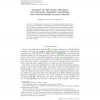Free Online Productivity Tools
i2Speak
i2Symbol
i2OCR
iTex2Img
iWeb2Print
iWeb2Shot
i2Type
iPdf2Split
iPdf2Merge
i2Bopomofo
i2Arabic
i2Style
i2Image
i2PDF
iLatex2Rtf
Sci2ools
MOC
2000
2000
Analysis of the finite precision bi-conjugate gradient algorithm for nonsymmetric linear systems
In this paper we analyze the bi-conjugate gradient algorithm in finite precision arithmetic, and suggest reasons for its often observed robustness. By using a tridiagonal structure, which is preserved by the finite precision bi-conjugate gradient iteration, we are able to bound its residual norm by a minimum polynomial of a perturbed matrix (i.e. the residual norm of the exact GMRES applied to a perturbed matrix) multiplied by an amplification factor. This shows that occurrence of near-breakdowns or loss of biorthogonality does not necessarily deter convergence of the residuals provided that the amplification factor remains bounded. Numerical examples are given to gain insights into these bounds.
| Added | 19 Dec 2010 |
| Updated | 19 Dec 2010 |
| Type | Journal |
| Year | 2000 |
| Where | MOC |
| Authors | Charles H. Tong, Qiang Ye |
Comments (0)

